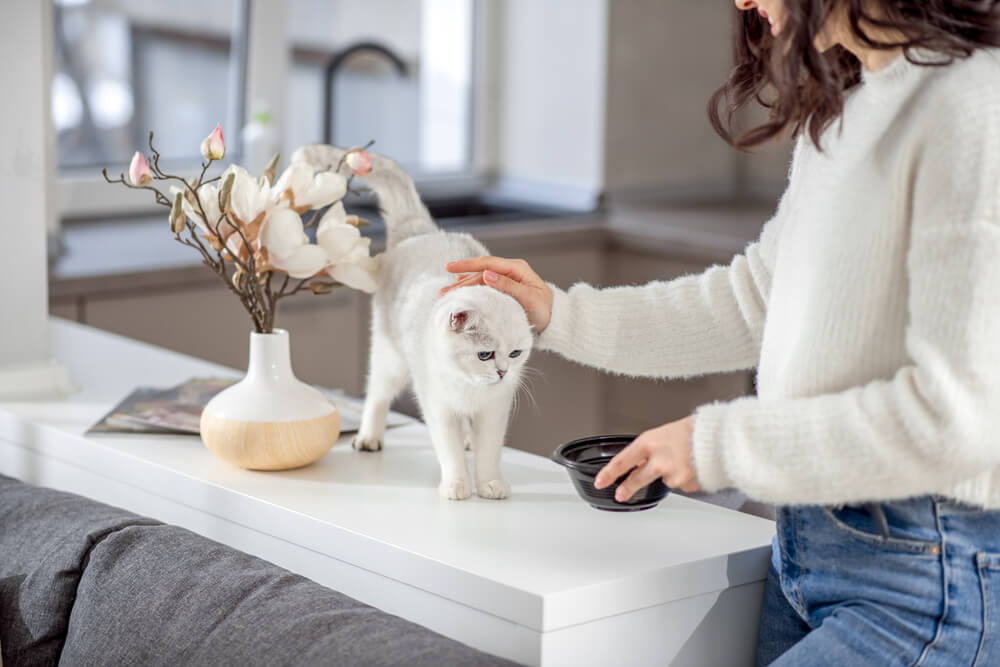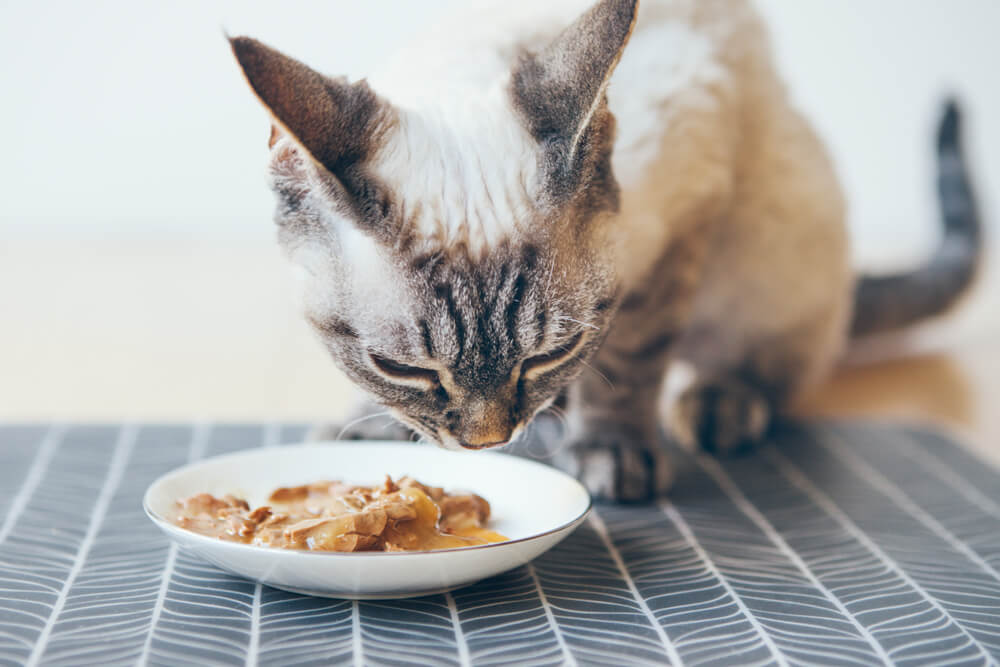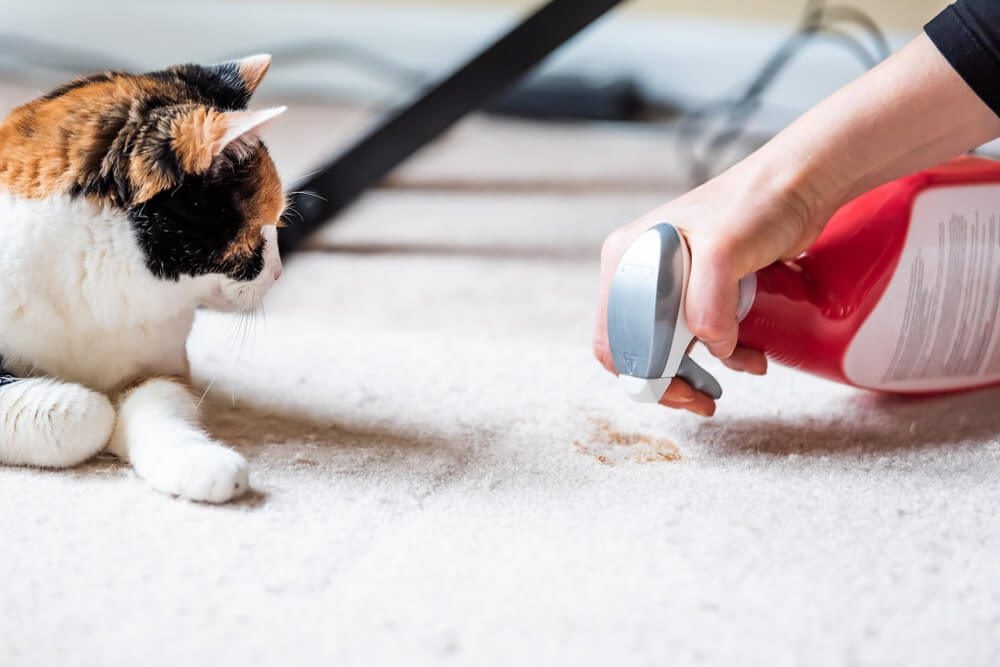What to Feed a Cat with Diarrhea: Pointers You Need to Know

Table of Contents
Is Wet or Dry Food Better for Cats with Diarrhea?

In general, wet food is better for cat diarrhea. Wet cat food contains more water than dry food and helps hydrate cats. However, what to feed a cat with diarrhea depends on the cause of your cat’s diarrhea.
Cat diarrhea and loose stools can be triggered by many causes. Some of the most common causes of diarrhea in cats are dietary changes, dietary indiscretions, food intolerances, food allergies, and inflammatory bowel disease (IBD).
Other possible causes of watery stool in cats are bacterial infections (Salmonella), viral infections (panleukopenia), and intestinal parasites (roundworms, Giardia, Coccidia). In addition to changing the consistency of the cat’s stool, these pathogens cause bloody or tarry diarrhea, weight loss, and in severe cases, can be life-threatening.
What Is the Best Food for a Cat with Diarrhea?
Want to know what to feed a cat with diarrhea? Here is a list and explanation of some of the best foods for managing cat diarrhea.
- White Rice. Boiled white rice contains a healthy amount of fiber and moisture, so cats get the digestive aid and hydration they need. This can help to minimize the impact of diarrhea on a cat.
- Bone Broth. Providing hydration, protein, vitamins, and minerals can be beneficial to cats with diarrhea. Bone broth contains all of these and can be paired with a bland diet or with the cat’s food.
- Chicken. Cats are obligate carnivores which means they need meat to thrive. If a cat’s diarrhea was brought on by new food or food allergies, then a bland diet of chicken and boiled rice will help manage the problem.
- Fish. This can be part of a bland diet in place of chicken. Adding fish to the cat’s diet is a good way of feeding lean and healthy proteins. Plus, fish is easily digestible for cats.
- Pumpkin. Pumpkin is rich in vitamins and fiber that help cats recover from diarrhea. This can also be given to cats regularly to prevent gastrointestinal issues and maintain a pet’s health. Pumpkin is the most popular home remedy for a sensitive stomach.
- Fiber. Fiber is an indigestible carbohydrate that adds bulk to feces as it moves through a cat’s digestive system. Fiber can be especially helpful in cases of diarrhea that involve watery or loose stool.
- Probiotics. Probiotics help normalize bacteria growth in the gut and prevent certain causes of diarrhea. Probiotics regulate bowel movements (help with diarrhea and constipation) and can also boost the immune system.
- Metamucil. Metamucil is a safe dietary supplement for cats that adds mass to fecal matter and can be used to treat or prevent the onset of diarrhea.
- Electrolytes. Cats with diarrhea are losing water and becoming dehydrated. Electrolytes are nutrients like sodium, potassium, and chloride that help your body regulate chemical reactions and maintain the balance between fluids inside and outside your cells.
- Water. Providing fresh water and encouraging your cat to drink enough water will keep the cat hydrated and prevent dehydration.
- Anti-Diarrheal Medication. This type of medication is made to ease symptoms of indigestion and shorten bouts of diarrhea. Although some medications can be found over-the-counter, it is highly recommended to consult with the vet before giving them to your cat.
What Should I Not Feed My Cat with Diarrhea?

Now that you know what to feed a cat with diarrhea, it is normal to wonder what food you need to avoid. Here are some of the foods pet owners should not give to cats as they are too strong for the digestive tract.
- Fatty Foods. Excessive fat intake can cause digestive upset and frequent trips to the litter box. When a cat has diarrhea, it is best to feed them a bland and low-fat diet until it is resolved.
- Raw Meat. Raw meat is generally not safe. It is a host to many bacteria and viruses that can be transmitted if the meat is not properly cooked.
- Eggs. Although eggs are not bad for cats, the high concentration of fat in the yolk can cause diarrhea to worsen. Plus, they are not easily digestible and should be avoided during diarrhea episodes.
- Dairy. Most adult cats are lactose intolerant – lack the enzyme necessary for digesting lactose (the main milk sugar). Giving dairy to cats causes diarrhea, and in cats with already lose stools, it makes the situation worse.

















